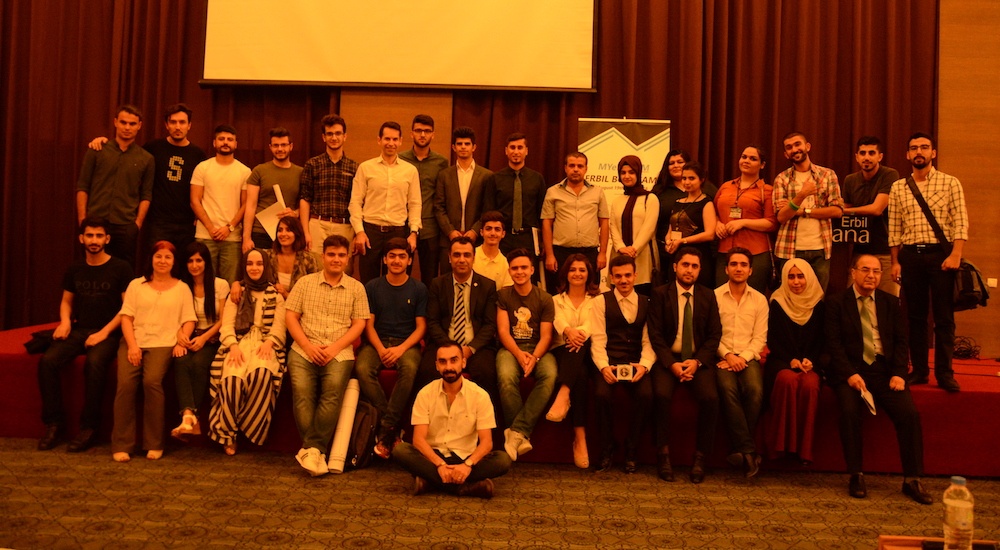To dream the impossible dream: an Erbil incubator

When Mashal Sadiq arrived in Erbil after completing her undergraduate studies in the UK she was just looking for a little break from the hectic life of London.
Just over a year later she is working on an project that she hopes will shape the start of her entrepreneurial career.
Earlier this year Sadiq took second place at a two-week bootcamp organised by My (Entrepreneurial) Dream, a locally founded incubator looking to build up the Kurdistan startup scene.
Sadiq’s idea, a platform for creative freelancers looking for work, came about after she moved to Erbil. As an interior design and architecture graduate she was looking for suitable work in the field. There was nothing. What there was, though, was a quickly growing number of people requesting her services for everything design related. So there was a market.
She soon discovered there were many others just like her: creative talents finding work but only through word of mouth.
Then Sadiq and a friend decided to go to the bootcamp in August.
“It wasn’t what I expected at all,” she told Wamda. “I learnt a lot, I had no idea how hard it could be to start a business but the bootcamp got me through things step by step."
A startup community?
"There is a world, post-ISIS, that we need to think of,” said Rebeen Pasha, founder of My E Dream. Talking to him on a Skype call from Erbil, Wamda found the Iraqi Kurdish American to be very positive about the future of a startup ecosystem in Iraqi Kurdistan.

"I'm pleasantly surprised of the breadth and depth of tech entrepreneurship, self taught, that exists but also how much basic business and soft skills they're lacking," he said. "We can offer to help them become products and businesses that are focused on their customer and fit into their market and their communities."
In 2014 Pasha, then an employee of USAID decided he wanted to reconnect with his roots in Iraqi Kurdistan and do something to help young people shape their futures.
“I’ve seen this in other countries,” he said. “The younger generation is not just the future, but the present fate of the country and the region. With 50 percent under 20, and yet 50 percent in the public sector, and so much despair and crises, we had to do something from within to re-instill hope, ownership, and livelihood, and not just the business as usual and aid.”
Getting started
Over the course of a year he came up with My E Dream, which he launched in October 2015."It's the experience and advise and study of other ecosystems and applying it to the needs of Iraq, what it'll take to get us there," he said.
By August 2016 they hosted the first bootcamp. Pasha was pleasantly surprised by the turn out. “'Oh you won’t get 40’ people had said to me, I was hoping for about 80 but in the end 165 people signed up,” he said.

Attendees were aged 16 to 34 and after two weeks there were four ‘champions’. First and second prizes went to women, one of whom was Sadiq.
Over the course of the past year, and particularly after the success of the summer bootcamp, there is more support, but still largely in ‘championing’ his efforts, rather than financially supporting them. They relied on a local hotel to provide a space for the bootcamp and as yet he is still to have a permanent physical space for his incubator.
Currently they’re in the process of finalizing some space (a warehouse and a dedicated university-attached space,separately). They recently signed an MOA with a “major US-based social incubator to help, and 1776 are also willing to help with virtual mentorship”.
Steep learning curve
Much like Sadiq struggling to find employment in Erbil, Pasha told Wamda that he really had no idea just how hard it was to do business in Iraq and the Kurdistan region.
“The level of psychological trauma that people have undergone after decades of uncertainty and how that translates into a survival mentality, that affects every level of interaction you embark on, which is not obvious at first but then you also have to decipher,” he said.
As a result Pasha feels this has led to societal barriers such as a lack of collaboration, trust, and standards of good governance.And the support isn’t just lacking there.“To people outside of the region it’s ‘oh there’s a war going on’,” he said.
“The entrepreneurship is the people doing their part to fight ISIS, rebuild the economy, doing it responsibly. That includes women, minorities, young people. You’re not going to get big American companies coming here to hire thousands of people.”Regional support is also hard to come by, with promises being reneged on at the last minute.
Next steps
Sadiq is now going to move forward with her platform for freelance creatives. Working with Pasha she hopes to eventually include other industries for job seekers and employers.
“There is so much we’re missing, so many gaps business wise, and I think what he’s [Pasha] doing is a good start to get people to have more initiative and be independent,” she said. And there was another plus - as a result of her competition in the bootcamp Sadiq ended up with a job at a local advertising agency.Pasha told Wamda that one attendee had said to him ’no one ever asked us before if we had a dream’. “Now there’s an amplifying message,” Pasha said.
Feature image via My E Dream


